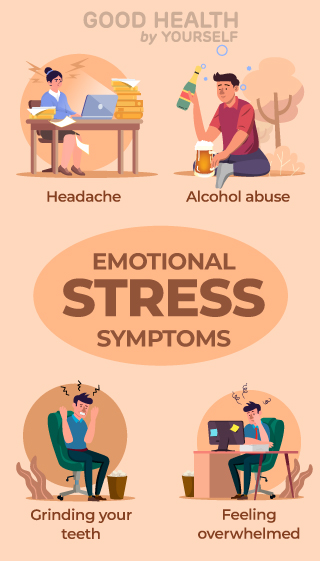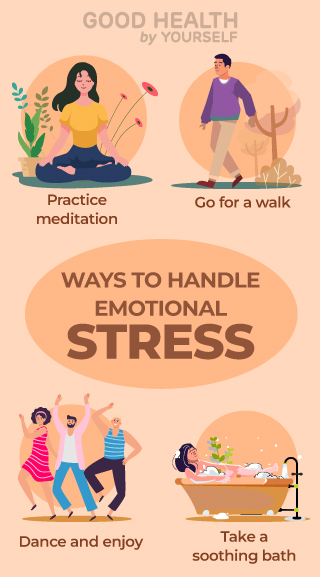How to deal with emotional stress

Key Highlights
- Identifying emotional stress can be challenging.
- Emotional stress can sometimes disable your decision-making.
Are you not feeling like yourself lately? Has your concentration level decreased and performing simple tasks has become difficult? You are not sick but are you feeling very tired, bored, and sad for no reason? Is your colleague’s comment bothering you too much? Did you end up crying at the smallest of comments directed at you?
If you have answered in the yes to the above, you could be suffering from what is known as emotional stress! Emotional stress may sound new to you but almost all of us experience it, especially in such highly competitive times and hectic work-life environments.
Stress and health
Human bodies can react differently to different situations. Stress is a normal body reaction to particular situations. The human body is meant to react to stress. When we experience any type of change or a challenge, our body gives rise to physical and mental responses. These are stress responses.
Stress helps us face various situations and be prepared. E.g: you may be stressed before an important presentation in your office and stay back late to make a nearly perfect one.
Some amount of stress is good for us. However, chronic stress is harmful and can affect your quality of life. Stress manifests itself in many symptoms like headaches, chest pain, elevated blood pressure, digestion problems, etc.
Similarly, it can also give rise to mental and emotional symptoms like anxiety, depression, sadness, and panic attacks. People who are under stress for a long time, often resort to unhealthy habits such as substance abuse, alcoholism, smoking, or overeating. It is not easy to identify stress.
Emotional stress – Are your emotions going out of control?
As humans, we go through a lot of emotions in our lives. Feeling happy, sad, angry, irritated, and worried, are a few of our emotions. However, when you are stressed, it can get the better of these emotions, causing you to experience emotional stress. Emotional stress can interfere with your ability to do things and get things done.
Identifying emotional stress – What’s wrong with you?
Emotional stress or stress, in general, may go unnoticed since its manifestations can coincide with those of any disease. Also, many times, the person under stress may ignore his symptoms thinking of them to be short-lived. But, these symptoms may recur and can cause detrimental effects to your health if not taken care of.
Identifying emotional stress may get challenging for your doctor too. You need to introspect how you are feeling. If you find yourself getting angry or sad or worried, now and then, you need to seek help. You can maintain a diary to note down how many times you felt emotionally unstable in the past few days.
The following are some of the common emotional stress symptoms which are similar to symptoms of stress and anxiety:
- Heaviness in the chest
- Increased heart rate
- Pain in the neck, shoulders, and back
- Headache
- Grinding your teeth
- Shortness of breath
- Excessive fatigue
- Feeling depressed
- Sleep problems
- Upset stomach or constipation
The peculiar mental or behavioral symptoms of emotional stress include:
- Being more emotional than usual
- Feeling overwhelmed
- Forgetfulness
- Trouble making decisions or solving problems
- Alcohol abuse
10 ways to handle emotional stress
Emotional stress can be managed in a lot of ways. These are more or less similar to the methods used to tackle any kind of stress at an individual level.
Here are ten ways to handle emotional stress will help you get rid of your worries:
1. Practice mindfulness
Mindfulness is learning how to focus your attention and become more aware of yourself. It is about being more present. You must do this in a quiet and comfortable environment, away from all distractions. You can learn to feel the physical changes in your body that happen in response to your changing emotions.
Understanding this mind-body connection is the first step in taking charge of your emotions and learning how to better manage your stress. By doing this, you will understand what exactly stressed you out and how you can handle it.
2. Practice meditation
People often confuse meditation and mindfulness. Mindfulness makes you aware and meditation directs you to a more calm and peaceful state.
Meditate in a quiet place and try breathing exercises for stress like deep breathing. You can manage your emotions and reduce your emotional stress by choosing what you think about, such as positive thoughts or warm, and comforting memories.
3. Read a book
There is nothing better than some relaxing and peaceful ‘Me’ time. In this fast-paced world, we often miss out on grabbing a moment of calmness and reading can be the perfect start.
Reading a book fully engages our minds and sparks our imagination. Since the brain is focused on a single task, it reduces our stress and promotes relaxation. When was the last time you read your favorite book? Go grab it!
4. Take a walk
Walking helps you get away from stressful event not just physically but also mentally. It allows you to think, and evaluate, and if you have your favorite company along, it is a cherry on top of the cake.
Walking helps to release brain chemicals called endorphins, that stimulate relaxation and improve your mood.
5. Exercise
Any form of exercise is good for busting stress. It increases your overall health and your sense of well-being. When you get moving, the brain releases endorphins that make you feel good and relaxed. It subtracts the negative thoughts and allows you to focus on the exercise being performed.
Regular exercise can increase self-confidence, improve your mood, help you relax, and lower symptoms of mild depression and anxiety. Exercise can also improve your sleep, which is often disrupted by stress.
6. Dance your way
Dance is an art form that helps you express your emotions. When one dances, the brain has to coordinate with the body and mind to completely coordinate between music and movements.
Dancing to one’s favorite music and enjoying it helps an individual focus strictly on the moment they are in. This aids in controlling the release of cortisol hormones from the brain, which helps in lowering stress and tension levels.
7. Do yoga
Yoga is a mind-body practice that combines physical poses, controlled breathing, and meditation or relaxation. Yoga may help reduce stress, lower blood pressure and lower your heart rate.
Hatha yoga, in particular, maybe a good choice for stress management. Hatha is one of the most common styles of yoga, and beginners may like its slower pace and easier movements. Yoga can enhance your mood and overall sense of well-being.
8. Music Therapy
Have you heard of music therapy. Upbeat music can make you feel more energetic and positive about life. A slower melody can calm your mind and relax your muscles, making you feel soothed while releasing the stress of the day.
9. Enjoy a soothing bath
Stress causes the muscles of the body to contract. A soothing warm bath can help reduce stress as our skin releases endorphins when in contact with warm water.
Stretching and moving in the water also provides a low-impact workout for discomfort in muscles, joints, and bones.
10. Light a scented candle
Scented candles have been used for centuries in various rituals as they promote healing, enhance meditation and cleanse energies.
The gentle, mesmerizing quality of their light makes them a perfect aid for any relaxation routine. The smell of these candles stimulates our brain to relieve stress and improves mental clarity.
Conclusion
Stress is not new to us, especially these days. However, it can affect our emotions and cause emotional stress. Emotional stress can make it difficult for you to focus and manage simple daily tasks. It also makes you more forgetful. However, you can take steps to handle this emotional stress.
Similar to the steps taken for managing any kind of stress, you need to be patient and start following some changes in your daily routine. It is good to keep a note of your symptoms and speak with a doctor for more clarity.
On the other hand, you can start practicing things like meditation, mindfulness, reading books, listening to music, and exercising to start seeing changes in your emotional stress response.
Stay strong, and make your way through emotional stress.





